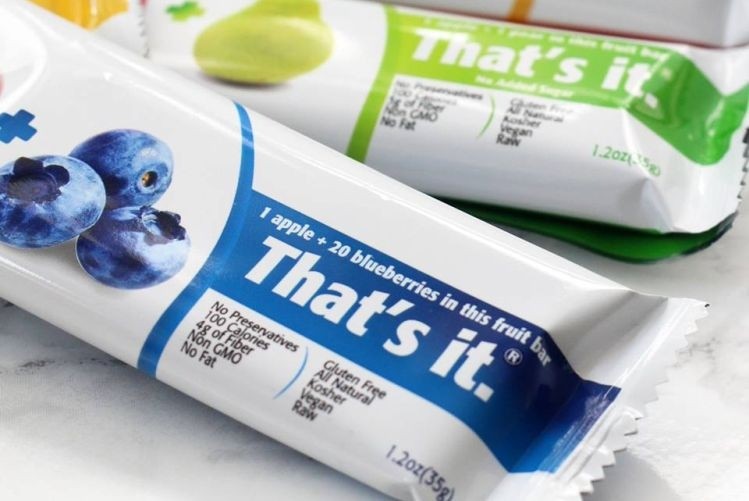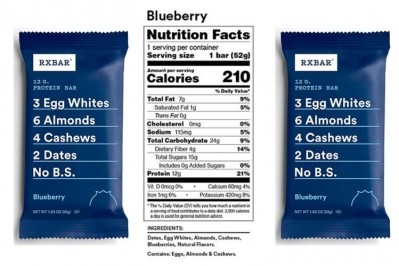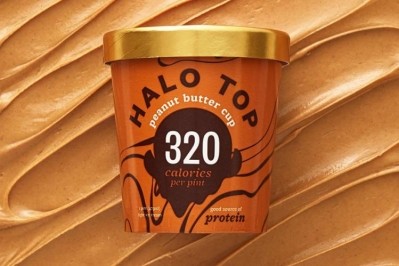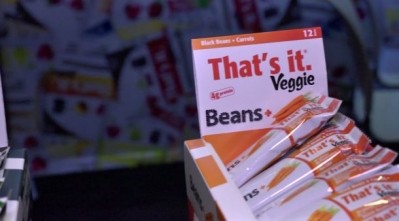Trader Joe's, That's It, targeted in fruit bar legal action in New York
That’s It founder blasts meritless and “reckless” lawsuit

That’s It fruit bars have carved out a distinct niche in the fruit snack market in part because the ingredients list is so simple, typically featuring two ingredients, for example: ‘apples, mangos’ or ‘apples, blueberries.'
They also tick all the boxes when it comes to what consumers say they are looking for from snacks: simple, nutritious, portable products with short ingredients lists, names that they recognize, and fruits or veggies that are convenient, but not so heavily processed that they cease to deliver any meaningful nutrition or fiber, says the company.
And while brands like Peeled Snacks and Bare fruit chips have taken the category in a similar direction by going back to basics, That’s it occupies a slightly different position (it’s a bar, not a bagged snack), and has a moist, more juicy texture like some bagged dried fruits, but without any preservatives and no added sugar.
Plaintiff: 'It is highly probable that the generic description of 'apples' encompasses the presence of apple (and other fruit) powder'
In a complaint filed in the eastern district of New York seeking to represent a nationwide class of consumers, plaintiff Anthony Medina says that the fruit bar labels list generic/collective names [eg.apples] rather than specific ingredients.
This, he alleges, sends out the message “that the defendant or any manufacturer was responsible for taking the whole intact fruit, washing it, dicing or chopping it, then mashing it together to form the final bar, so that the product can credibly attest that it contains ingredients identified by a collective name.”
According to Medina, the only way you can manufacture fruit bars without using binders such as gels, pectin, juice concentrates or syrups, is by using “ingredients which have already been subjected to various levels of processing and transformation [eg. fruit powders from juice concentrates] such that designating them by their collective name [eg. ‘apples, blueberries’] is misleading... It is highly probable that the generic description of 'apples' encompasses the presence of apple (and other fruit) powder.
"Apple powder (and fruit powder generally) is used for its functional properties, including (1) binding the components together because it contains pectin, (2) aiding humectancy, (3) increasing fiber content, (4) controlling water activity and (5) assisting with pH regulation. The most common ways to make fruit powder are drum drying and spray drying. In both methods, the input is juice or puree from the subject fruit or vegetable."
He also alleges that, “The inclusion of dried apple and other fruit/vegetable ingredients – powders and pieces – means water must be added to reconstitute or rehydrate them, prior to the time the final product is finished. The products do not indicate the presence of water in the ingredient list, which is misleading.
"Defendants's representations have enabled them to command a substantial premium in comparison to alternative bar products which use specific instead of common names to designate their ingredients."
A near identical lawsuit** has also been filed by the same law firms - Joshua Levin-Epstein of Levin-Epstein & Associates PC, and Spencer Sheehan of Sheehan & Associates PC - against Trader Joe's, about which the retailer has not responded to requests for comment.
Dr Lewensztain: We stand by our food and our labeling
That’s It founder Dr Lior Lewensztain said the allegations were without merit and he planned to vigorously defend his company, adding: “The allegations in the complaint are reckless and without merit. We stand by our food and our labeling, and will vigorously defend the company.”
On the FAQ section of the company's website under a question asking, 'What's your manufacturing process?' the company responds: "We designed a proprietary process that stabilizes fruit + veggies for two years. We don’t use any preservatives, juices, concentrates or purees, + we’re all natural, kosher, vegan + raw."
Attorney: Most likely, the manufacturer will claim its manufacturing process to be a trade secret
Commenting independently on the complaint (he does not represent either party), Wendel, Rosen, Black & Dean partner William Acevedo told FoodNavigator-USA: "This is an interesting case because it presents a largely straightforward expression of incredulity, which ironically, is the product’s name: That’s It. In other words, the plaintiff cannot believe that the only ingredients in the bars are fruit, or that the products could be made using such simple ingredients, and the complaint openly expresses this skepticism.
"Either the manufacturer has failed to make requisite ingredient declarations or the plaintiff is simply mistaken that something else must be in there."
Given that the manufacturing process is proprietary, That's It Nutrition won't want to disclose details via public court filings that could show rivals how it makes its products, he said.
"Most likely, the manufacturer will claim its manufacturing process to be a trade secret, and it will seek to have a stipulated protective order put in place with attorney’s eyes only designation provisions so that it can share the manufacturing details without fear that they will be made public."
I am surprised that this action has been filed
As a side note, he said: "I am surprised that this action has been filed. If the labels are accurate, you would think that seasoned counsel would have already done informally what I mention above - negotiation of protective order and minimal sharing of information to allay the plaintiff’s concerns - so that the matter could be resolved short of litigation."
He added: "I have no idea what pre-litigation discussions, if any, that counsel for That’s It Nutrition, LLC may have had, but I certainly would have thrown down my cards well before this became a matter of public record."
'A reasonable consumer would certainly understand that something happened between the apple and blueberries being picked and being packaged'
William Dance, an attorney at law firm Tucker Ellis (who is also not involved in the case), noted that a reasonable consumer would accept that some kind of processing has taken place given that, "One cannot look at the That’s It Apple + Blueberries package, for example, and reasonably believe the package contains an entire apple and 20 blueberries in the same state they are found in nature."
The packaging, meanwhile, "does not state the apple and blueberries inside are fresh," added Dance, who noted that discovery could proceed in a very limited way "under a strong protective order or even under seal, so That’s It can protect its trade secrets."
He added: "A reasonable consumer would certainly understand that something happened between the apple and blueberries being picked and being packaged. The case will likely turn on what amount and what type of manipulation That’s It puts the fruit through between picking and packaging. A reasonable consumer might expect not much more than dicing, dehydration, and compression, and if that is all, or most, of what That’s It does to make the bars, plaintiffs would not seem to have much of a claim."
*The case is Medina v That’s It Nutrition LLC. 1-18-cv-02022 filed in the U.S. District Court for the Eastern District of New York.
**The case is Jamison v Trader Joe’s Company and Trader Joe’s East, Inc 1:18-cv-02216 filed in the U.S. District Court for the Eastern District of New York,
The plaintiffs are represented by Joshua Levin-Epstein of Levin-Epstein & Associates PC, and Spencer Sheehan of Sheehan & Associates PC and allege violations of New York general business law, breach of express warranty and implied warranty of merchantability, fraud, and unjust enrichment.

















